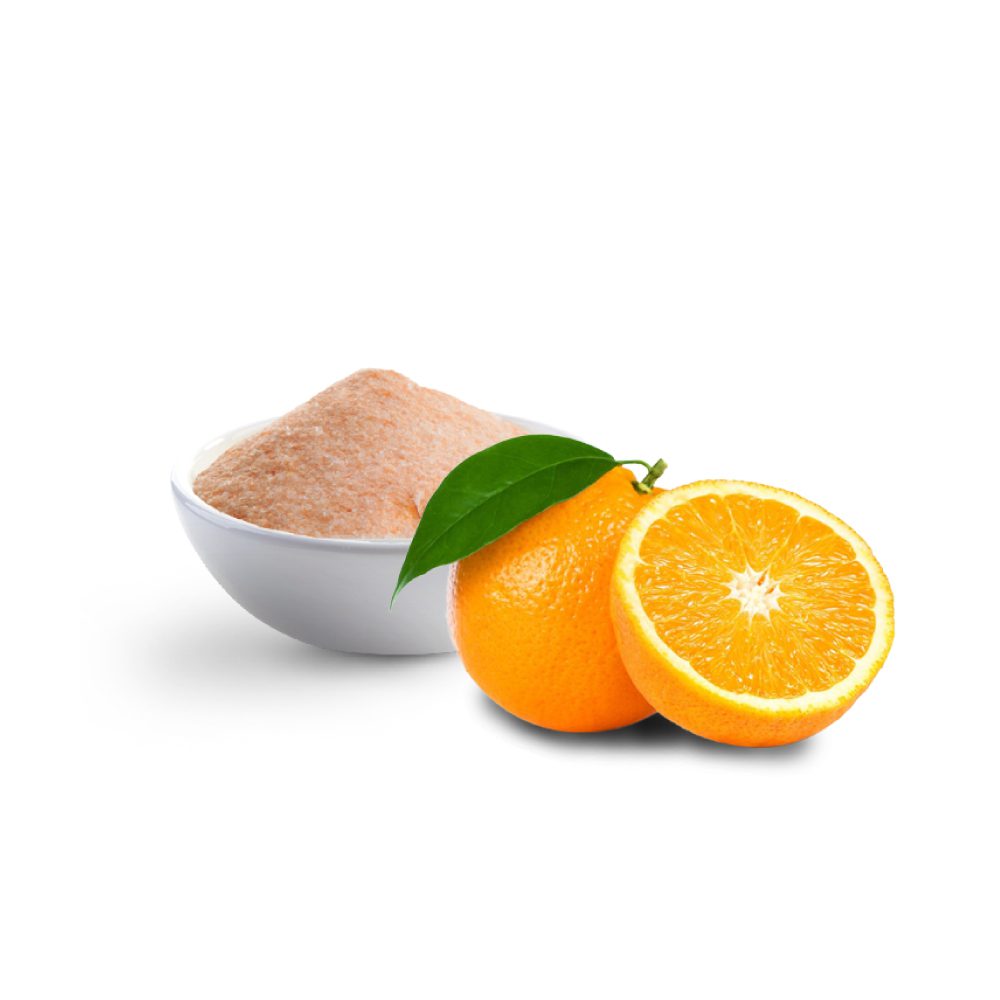Dried Orange Powder

Oranges are a type of citrus produced by the orange tree and are an excellent source of vitamin C. Vitamin C in oranges helps absorb calcium in the body. It also contains vitamin A and is a source of sodium, potassium, magnesium, copper, sulfur, and chlorine.
It is considered one of the foods that form alkalis, as it leaves behind an alkaline substance in the tissues and is then exploited, and this is what leads to improving and raising the body’s resistance.
Orange ingredients and benefits:
Oranges contain twenty-eight nutrients, the most important of which are:
iron, fructose, phosphorus, vitamin B1, vitamin C, and calcium. Oranges help stabilize calcium in the bones and prevent infectious diseases, typhoid fever, and whooping cough.
Its leaves are also used to treat headaches and chest coughs. It also contains citric acid.
Every 100 grams of oranges contains 43 calories. It is also considered one of the most important components of alternative medicine.
Because of its benefits. Doctors have proven the high value of oranges, as they stimulate the appetite, purify the blood, relieve flatulence, and soothe the gallbladder.
It is also refreshing, cooling, and a mouth cleanser.
It is an anthelmintic, an analgesic for abdominal pain, a bone strengthener, strengthens the nerves and heart, and a hypnotic, soothing, and soothing to the brain. It strengthens nails, hair, and teeth and reduces fat (cholesterol).
Regulates the human respiratory system. It is also an anti-cough and anti-flu.
Orange regulates the work of muscles and veins and increases calcium.
Anti-venereal diseases, syphilis, and some syphilis. Beneficial for skin diseases such as scabies. It helps to remove the effects of poisoning as a result of the use of chemical-based medicines.
It strengthens the nervous and digestive systems and is useful in treating seat tumors and hemorrhoids.
It prevents many cancer diseases.
Orange is a useful agent for eliminating some infections in the reproductive system in women, and its juice is useful and replaces breast milk. Useful, fragrant, and good with salad.

Types of oranges:
Sweet oranges, called sugar oranges, are considered one of the most economically important types of oranges, and this type is mostly used to make concentrated juice that is packed in special containers for drinking.
Tangerine oranges are a type of small, very sweet orange with a thin, loose peel that is easy to separate from the cloves. Some strains of this orange, such as the Satsuma orange, do not have seeds.
This type of orange is used as a fruit for sweetening and canning.
Civil oranges, or citrus oranges, which are mainly grown in Spain, and Bergamot oranges which are grown in southern Italy and in Sicily, from which oil is extracted by pressing and used for flavoring and in the perfume industry.
Navel oranges are so named because of the navel-like protuberance at the top of the fruit.
Above an orange in the tree
Japanese orange – Kumquat is called kumquat, golden orange, or Japanese orange.
It is a small orange-colored fruit, remotely resembling a yellow date. It has one to three seeds per orange has a sweet, slightly sour taste, and is rich in nutrients beneficial to the body.

Nutritional information:
According to the US Department of Agriculture, each orange (184g) contains the following nutritional information:
Calories: 86
Fat: 0.22
Saturated fat: 0
Carbohydrates: 21.62
Fiber: 4.4
Proteins: 1.73
Cholesterol: 0

Health benefits of oranges:
Below are the health benefits of oranges in detail:
1. Cancer prevention:
Oranges are an excellent source of the antioxidant vitamin C, which may contribute to the prevention of free radicals that cause cancer.
The anti-inflammatory properties of orange will help protect against chronic inflammation that stimulates the growth of cancer cells.
2. Lowering cholesterol:
Oranges’ high soluble fiber content makes them very beneficial in lowering blood cholesterol levels.
The white orange peel (pulp) also contains flavonoids that help reduce bad cholesterol.
3. Promoting cardiovascular health:
Orange is a fruit rich in potassium and fiber, which are substances responsible for regulating and enhancing heart function.
Potassium is an important component of cells and body fluids that helps control heart rate and blood pressure.
When potassium levels decrease, the heartbeat becomes abnormal in a condition called arrhythmia.
Oranges also have a role in reducing blood pressure, as potassium and flavonoids help regulate high blood pressure.
4. Strengthening the immune system:
Oranges strengthen the immune system.
They are rich in vitamin C, which protects cells by resisting free radicals that cause chronic diseases, such as cancer and heart disease.
Its antioxidants also work against viral infections, as the abundance of polyphenols in oranges protects against viral infections.
5. Prevention of constipation:
Oranges contain a high percentage of dietary fiber, which stimulates the digestive juices in the digestive system and facilitates the work of the intestines and digestive processes in general, which helps in preventing and treating constipation.

6. Maintaining healthy skin and eyes:
Due to the presence of vitamin C in oranges, it can help maintain the health and appearance of the skin and prevent signs of aging.
Vitamin C also contributes to the production of collagen, which supports the skin, improves its strength, and promotes wound healing.
In addition, oranges help prevent age-related macular degeneration, protect against cataracts, and preserve vision.
7. Enhance iron absorption:
Since oranges are a rich source of vitamin C, eating them with food sources rich in iron enhances the absorption of iron in the intestine and prevents anemia.
8. Oranges are a nutritional treasure:
Oranges contain simple sugars that provide the body with energy, making them a special food for athletes.
Oranges are low in calories and do not contain saturated fats or cholesterol.
Oranges are also a great way to get a large dose of folic acid naturally so that the body can use it in cell division and making DNA. It is one of the B vitamins that is especially important for pregnant women. Because it helps prevent birth defects.

